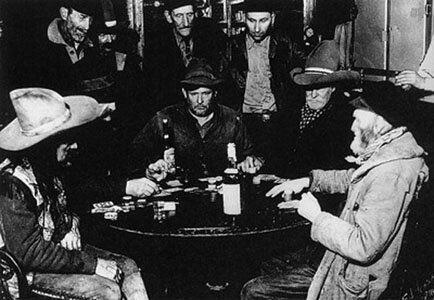Hazardziści

Mam nadzieję, że na zbliżającym się wielkimi krokami spotkaniu blogerów z Glebem Chlebowskim padnie wiele pytań dotyczących gier hazardowych, zaś sam zainteresowany tego rodzaju rozrywką, szczerze na pytania odpowie. To może być historyczny wieczór! Szkoda, że red. Janke nie zaprosił M. Drzewieckiego, bo byłoby jeszcze weselej :)
Kto zresztą nie lubi hazardu? I kto nie lubi wygrywać, inwestując mało lub niewiele? Ileż osób uważa, że np. wygrana w totka im się po prostu należy? Iluż ludzi uważa, że „nie może żyć jak ta ganiająca w szale zakupów po dyskontach hołota”? Ha! Ale na takie życie trzeba sobie zasłużyć. Jedną z dróg dojścia do wielkich pieniędzy jest w Polsce „uprawianie polityki”. Celowo biorę frazę w cudzysłów, ponieważ w naszym kraju zostało już po wielokroć udowodnione, że ludziom idącym do polityki wcale nie jest potrzebna ani wiedza na temat prawa, ani wiedza historyczna, ani erudycja, ani nawet wyższe studia (jakiekolwiek, panie dzieju) – co więcej, że ktoś decydujący się na „wejście na scenę polityczną” wcale się na uprawianiu polityki znać nie musi. Za nic się nie odpowiada, przed żadnym trybunałem nie ląduje, z jednej partii można se przejść do innej, jeśli się robi niewesoło, no i generalnie zabawa jest taka, że nikomu krzywda się nie dzieje, jak to na bantustan przystało. Frajerów się goli za pomocą podatków, akcyz, niskich płac etc., zaś klasa próżniacza żyje sobie jak nowa szlachta.
Dlaczego więc się idzie do polityki? Między innymi z upodobania do hazardu. Trzeba mieć właśnie smykałkę do blefowania, grania twarzą, dokładnego obserwowania innych hazardzistów, a wszystko to po to, by wygrać wielką kasę przy niskim wkładzie własnym. To, że hazard zwykle wiąże się z kantowaniem, wiemy nie od dziś, podobnie zresztą polityka, która stanowi hazard wyższego rzędu. W momencie jednak jeśli się dobrze zabezpieczy relacje z mafią i służbami, to hazard może być nie tylko przyjemny, ale i pozbawiony nadmiernego ryzyka. Gra się wtedy głównie o wysokość sumy, czyli ryzyko dotyczy jedynie wielkości wygranej, nie zaś tego, że można cokolwiek stracić.
Na tym polegała Wielka Gra, jaką rozpoczęto w czerwcu '89. Ustalono bowiem wtedy, że „strony” się nie wyniszczają, tylko „wy” gracie pod siebie, a my pod siebie, frajerzy za to wszystko płacą i interes się kręci. O tym, że w Polsce jest korupcja wiedzą już nawet nie tylko przeciętni obywatele i dzieci, które już się uczą skomplikowanego systemu „dojść” - ale i piszą nawet w encyklopediach, co pozwalam się w całej rozciągłości zacytować poniżej:
„AFTER THE COLLAPSE of the Soviet Union, Poland moved with alacrity to establish a marketoriented economy. The transition was problematic. While elected officials were instituting new legal frameworks for business, including commercial codes, and tort, civil and contract law, white collar and organized criminal gangs in Poland quickly garnered significant profits through a wide array of illicit activities. Like other former Soviet Union-dominated communist countries throughout Eastern Europe, Polish regulators and law enforcement agencies were ill-equipped to differentiate between legitimate and illegal profit-seeking activities, especially in an era where legal and regulatory standards were slowly evolving. As a result, white-collar and organized crime flourished in Poland throughout the 1990s, and efforts to combat criminal activities were sporadic and ineffectual.
Despite increased efforts to combat criminal activity, Poland remains a major transit point for narcotics trafficking to Western Europe. Criminal gangs also routinely raise illicit proceeds through auto theft, extortion and counterfeiting schemes, and securities fraud. Polish criminal networks are also linked to the smuggling of alcohol, tobacco, fuel, and bulk commodities, especially coal and metallurgical products. According to Polish government estimates, organized crime activity generates criminal proceeds in the range of $1.5 billion to $3 billion annually. This money is laundered through Polish banks, currency exchange businesses, and casinos. Although Poland is not the leading jurisdiction of choice to launder proceeds for major criminal organizations from Russia, and Ukraine, the weak regulatory environment during most of the 1990s also enabled organized criminal gangs from neighboring states to transfer funds through Polish financial institutions to offshore financial centers. Poland also suffers from widespread white-collar crime. The large degree of white-collar crime is linked to historical factors, especially an entrenched pattern of bribery, originating during the Soviet era, that remains an integral part of the political and economic process, and an immense civil servant class that makes governmental processes obscure and impede transparency. White-collar crime is also facilitated by elite cronyism (kolesiostwo – przyp. F.Y.M.) and clan-like connections in the Polish business community. Consequently, Poland is routinely targeted by Polish media groups, non-governmental organizations, and international agencies, including the World Bank Group, which issue reports highlighting the link between white-collar criminals and government officials in the judiciary, law enforcement, and security services. The proceeds of white-collar and organized crime are routinely laundered through Polish financial institutions. Launderers use Polish financial institutions to transfer funds to Western European states that are in close proximity to Poland.
The Polish economy, large by regional standards, offers many avenues to launder illicit proceeds through its correspondingly large gray economy, promoted by a complex tax regime. Moreover, as a transit state between the European Union and the former Soviet Union, with a port on the Baltic, Poland has attracted organized crime groups from Western Europe and the Russian Federation. Funds are placed in banks, insurance companies, currency exchange shops, real estate, and short-term bonds. Although some of the proceeds of crime almost certainly leave the country, illicit profits are routinely invested in legal businesses, such as hotels, restaurants, and gambling parlors. Since the mid-1990s, efforts to combat whitecollar collar and organized crime in Poland have improved substantially. To limit the passage of illicit funds from organized criminal and white-collar crime through domestic banking and non-banking financial institutions, Poland initiated a rudimentary anti-money laundering regime with the passage of the 1992 banking regulation, Resolution Number 16, which required Polish banks to report suspicious transactions.
Additional measures were adopted through the 1990s. In 2000, the Sejm, the Polish Parliament, instituted a comprehensive antimoney laundering policy with the adoption of the Law on Counteracting the Introduction of Funds From Illegal or Unrevealed Sources Into Financial Turnover. This law, which came into effect on June 23, 2001, established a financial intelligence unit, and mandated the reporting of all transactions worth more than approximately $8,800. The law also mandated reporting requirements to include a broad range of non-bank financial institutions, especially brokers, investment and trust funds, insurance companies, casinos, money exchange shops, the Polish Post Office, leasing and factoring companies, pension funds, notaries, and real estate agents. Record keeping requirements for such transactions requires the maintenance in a database of information regarding the identity of the account holder owner of the funds for five years. Additional steps taken by Poland to combat white-collar and organized criminal activities were instituted to meet international norms, and ensure entrance into the European Union. To combat domestic white-collar and organized criminal activity, Poland increased international cooperation with the ratification of a series of significant international conventions, including The Convention on Laundering, Search, Seizure and Confiscation of the Proceeds from Crime in December 2000, and the United Nations Convention Against Transnational Crime in December 2001. The ratification of major international conventions in Poland formalized links to European law enforcement agencies, and ensures international cooperation in the battle against transnational criminal groups, and the passage of illicit funds across European borders.”
„Encyclopedia of White-Collar and Corporate Crime” (vol. 1-2), ed. Lawrence M. Salinger, SAGE, Publications, London 2005, s. 614-615.
I to jest właśnie piękne, prawda, Mr Chlebowski?
- Blog
- Zaloguj się albo zarejestruj aby dodać komentarz
- 793 odsłony



Komentarze
FYM - pięknie dobrałeś cytat
1 Października, 2009 - 10:06
To polski wkład w budowę nowego ładu w Europie. Polish white-collar + prof. Jan Łajdacki + mr Chlebo(bior)vsky.
Słowem Polnische Wirthschaft.
pzdr
Milton
bezkarnosc
1 Października, 2009 - 13:24
obecnie rzadzacych jest przerazajaca.Maja "swoj"wymiar niesprawiedliwosci,swoje media, we wszystkich stukturach wladzy kolesiow.Oczywiscie sasiedzi za granicami kraju, tez nie beda krytykowac,bo slabosc Polski dla nich to cos pieknego.Opozycja nie krytykuje, bo nie ma mozliwosci naglasniania.Kto ten burdel powstrzyma?W mediach dyskusje czy emerytury,renty,lecznictwo,pomoc rodzinom wielodzietnym itp.maja sens.Do czego polakom potrzebny rzad.Polska jest w wielkim niebezpieczenstwie.
FYM-ie
1 Października, 2009 - 16:06
Zapewne wiesz o tym, że jest już od dawna gotowy projekt ustawy antykorupcyjnej wykonany przez Julkę Piterę-od dorsza.
Projekt ten, trzeba przyznać obiektywnie, jest restrykcyjny i ma wiele ciekawych rozwiązań, które uderzałyby w bananowo-korupcyjny układ IIIRP.
Przykładem nowych rozwiązań jest prawny obowiązek składania oświadczeń o działalności zarobkowej przez "polityków", oczywiście ich małżonków, ale "również ich dzieci, wnuków, rodziców i rodzeństwa."
Tylko kto się na taki projekt zgodzi? Chłopcy i dziewczyny od kręcenia lodów? A może GW-cza?
Z pewnością nie "sitwa, która ma Polskę w dupie", a która obecnie rządzi w IIIRP.
Pozdrawiam.
Pozdrawiam
**********
Niepoprawni: "pro publico bono".
hazardzisci
2 Października, 2009 - 16:56
vikki
Nie wiem czy to nie za mocne i wogole mozliwe ale moze wprowadzenie stanu wyjatkowego moze uzdrowiloby panstwo. W stanie wyjatkowym wszystkie partie musza zawiesic dzialalnosc. Wowczas nalezaloby przeprowadzic lustracje i bezwzgledna dekomunizacje. Bez tego o uzdrowieniu Polski nie ma mowy. Moze sie myle i jestem tylko idealistka.
vikki